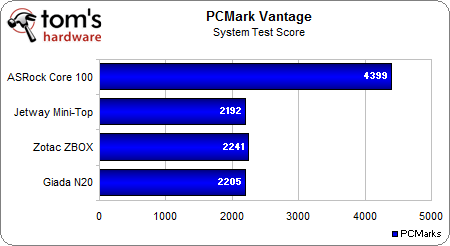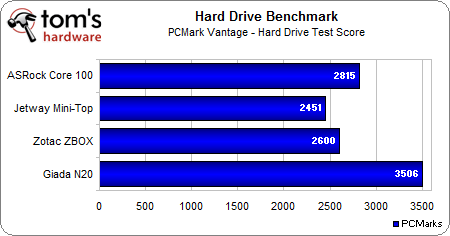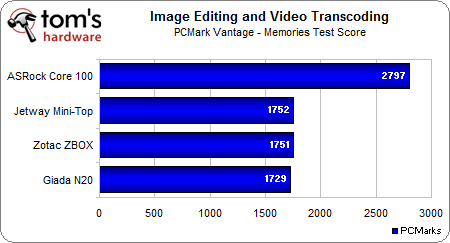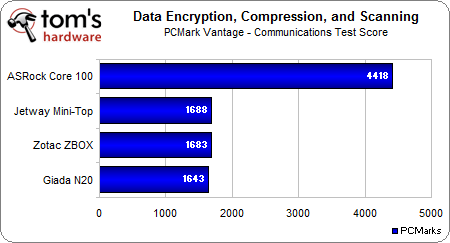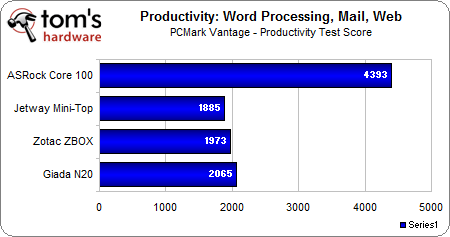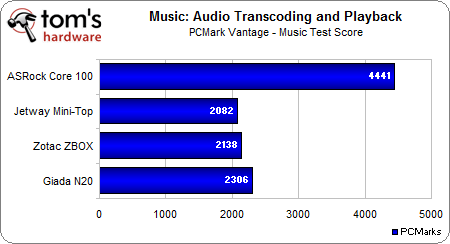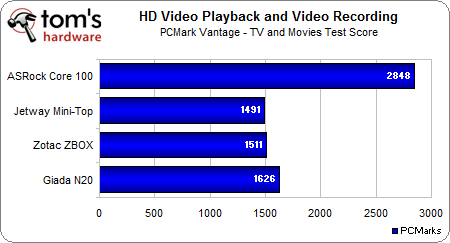Three Slim Atom/Ion 2-Based Nettop PCs Compared
We put Giada’s Slim-N20, Jetway’s Mini-TOP, and Zotac’s ZBOX to the test. Does Intel's Atom D500-series offer smooth performance in these nettops when it's paired with Nvidia’s ION 2 graphics, or does the platform fall short of entertainment excellence?
Benchmark Results: Productivity
The PCMark Vantage system score gives us an idea of how fast these Atom-powered nettops are in comparison to one another, and to the powerful Core i3-330M-equipped ASRock solution.
The Atom nettops are neck and neck, while the ASRock Core 100HT-BD delivers about twice the raw performance. The Giada Slim-N20 and its 1.66 GHz Intel Atom D510 CPU doesn’t seem to be at much of a disadvantage compared to the 1.8 GHz Atom D525 in the Zotac and Jetway PCs.
The PCMark hard drive bench shows that the 320 GB 7200 RPM Seagate Momentus in the Giada Slim-N20 provides a sizable hard disk performance advantage compared to the 5400 RPM drives in the other PCs. This might help even the odds in the benchmarks and offset the N20’s slower CPU.
When it comes to image editing and video encoding tasks, the ultra-slim nettops are neck and neck again, but the ASRock Core 100HT-BD flexes the power of its desktop-class Core i3.
Data encryption, compression, and scanning algorithms are CPU-centric tasks, and the Atom-equipped nettops struggle when compared to the Core i3-330M processor.
When it comes to word processing, email, and Internet-based tasks, the Giada Slim-N20 stands slightly above the other Atom-equipped nettops, probably because of its hard drive's faster rotational speed. The mobile Core i3 CPU walks away with another win here.
Keep in mind that this benchmark primarily tests how quickly these PCs can transcode audio, but it's not a measure of sound quality. The Giada’s hard drive performance helps it here, but this CPU-intensive task is owned by the ASRock Core 100HT-BD.
Get Tom's Hardware's best news and in-depth reviews, straight to your inbox.
The HD video benchmark test uses two simultaneous threads, one transcoding HD video to a media server archive and the other playing back HD video in real time. This is a CPU-intensive task that doesn’t reflect the quality of the video playback, something we’ll be investigating in a few pages. The ASRock system leads in this benchmark, with the Giada Slim-N20 taking a distant second thanks to its relatively fast hard disk.
Current page: Benchmark Results: Productivity
Prev Page Test Systems And Benchmarks Next Page Benchmark Results: GamingDon Woligroski was a former senior hardware editor for Tom's Hardware. He has covered a wide range of PC hardware topics, including CPUs, GPUs, system building, and emerging technologies.
-
hmp_goose Retest the N20's playback with a RAM drive for the temp files; I suspect the drive system is the issue . . .Reply -
cushgod SHould test results with a SSD complared to a "mechanical" HDD to see how much that can help an Atom move along :)Reply -
fullcircle_bflo So if I wanted a computer simply to stream internet videos to a television via HDMI(such as Hulu or CBS website), would any of these be a good candidate?Reply -
mchuf For $150 - $200, you can buy a used Pentium D or C2D pc off of craigslist. Add a $50 HD5450 gpu and a $40 wireless KB/M combo and your all set. That would be a more capable box than one of these things and at a lower price (even if you upgrade to Win 7 HP). Hell, even a used Mac Mini (old model) might be a more cost effective solution. Unless you're extremely tight for space, I don't see the appeal for an overpriced "net" device.Reply -
tipoo Zino HD review, please! At close to the cost of many of these nettops, it blows them away in performance and is almost as small and consumes almost as little power.Reply
